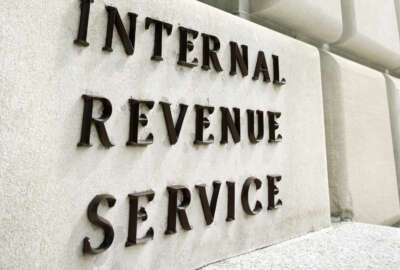
Ongoing feud between SSA OIG and FLEOA continues
In today's Federal Newscast, the spat between the Social Security Administration's inspector general office and a federal employee group continues.
To listen to the Federal Newscast on your phone or mobile device, subscribe in PodcastOne or Apple Podcasts. The best listening experience on desktop can be found using Chrome, Firefox or Safari.
- The spat between the Social Security Administration’s inspector general office and a federal employee group continues. The Federal Law Enforcement Officers Association said the IG’s office has yet to resolve their members’ concerns about the agency’s work environment. The association represents 90% of the agents at the SSA IG. It said morale among SSA inspector general agents is low and their work is suffering because of it. FLEOA took a vote of no confidence in SSA inspector general leadership.
- Next year’s budget from the White House will have a few new key details. The Office of Management and Budget will include an assessment of the federal government’s climate risk posture for the first time in next year’s budget submission to Congress. The president’s 2023 proposal will also discuss the impacts of climate change on the long-term budget outlook. The administration is beginning to revise procurement rules to address climate risks in federal contracting.
- Congress requires the IRS to hire private debt collectors to collect from taxpayers behind on what they owe. But National Taxpayer Advocate Erin Collins said the IRS is more likely to collect from taxpayers if it works with them directly. Private collection agencies can’t offer taxpayers a partial payment plan, or take taxpayers off the collection list due to recent hardships. Collins said taxpayers have the right to demand private debt collectors stop contacting them, and to instead have their debts handled directly by the IRS.
- A soon-to-be introduced bill would add more oversight to the Postal Service when it changes services standards. House Oversight and Reform Committee Chairwoman Carolyn Maloney (D-N.Y.) said she’ll soon introduce a bill that would strengthen the Postal Regulatory Commission’s oversight of USPS. The bill would allow the commission to request additional information from USPS before issuing an advisory opinion on service standard changes. The bill would also require two-thirds of the USPS Board of Governors to approve a change in service standards if the commission doesn’t have enough evidence from USPS to determine whether such changes be a net positive for the agency and its customers. (Federal News Network)
- The Biden administration’s cyber agenda gets an international flavor. Thirty-one countries said they will work with the private sector to increase information sharing around cyber risks. That was one commitment announced at the conclusion of the White House ransomware summit last week. The U.S. and its partners also said they would try to disrupt the ransomware business model by targeting illicit finances, including virtual assets like cryptocurrency. On Friday, the U.S. financial crimes watchdog said the $590 million in ransomware payments made in just the first half of 2021 exceeds the total reported for all of last year.
- The Biden administration’s pick for a key technology post gets her shot in front of the Senate this week. On Wednesday, the Senate Commerce Committee convenes a hearing to consider Laurie Locascio, the nominee to oversee the National Institute for Standards and Technology. Locascio spent much of her career at NIST as a bioengineer. She is currently vice president of research at the University of Maryland. NIST is the U.S. government’s scientific standard setting body. It’s currently playing a central role in the Biden administration’s efforts to bolster U.S. cybersecurity.
- U.S. Transportation Command has a new top commander — marking the first time the organization has been led by a woman. Air Force Gen. Jacqueline Van Ovost took command of TRANSCOM during a ceremony on Friday, replacing Gen. Stephen Lyons, who marked his retirement on the same day. Van Ovost previously led the Air Force component of TRANSCOM, Air Mobility Command, which played the leading role in the recent mass airlift during the U.S. evacuation of Kabul. Van Ovost is only the second woman to lead one of the military’s global combatant commands. The other was Gen. Lori Robinson, who led U.S. Northern Command from 2016 to 2018. (Federal News Network)
- President Biden plans to nominate a retired Air Force pilot as the top official overseeing the service’s real estate portfolio. The White House said he’s picked Ravi Chaudhary for assistant secretary for energy, installations and environment. Chaudhary last served as a senior official in the Federal Aviation Administration, where he oversaw the agency’s commercial space programs.
- The Navy is setting up a COVID Consolidated Disposition Authority to decide on how to separate sailors who refuse to get the coronavirus vaccine. The Navy mandated that active duty sailors must get their shorts by November 14 and Navy Reserve members must be vaccinated by December 14. The Navy said the board will ensure a fair and consistent process in handling separation determinations. About 89% of the Navy’s force is fully vaccinated.
- The Army is delaying a contract worth tens of billions of dollars and is supposed to help soldiers see better in the field. The Integrated Visual Augmentation System is being pushed back a full year. The collaboration between the Army and Microsoft is supposed to give soldiers goggles that provide augmented reality, showing maps, data and other important information. The Army said it’s not expecting to field the system until September 2022. The $22 billion program has had some issues in the past. Congress mandated a full report on the Army’s development of the program and cut its funding by a quarter of a billion dollars in the 2021 budget. (Federal News Network)
- GSA is putting its customers at the center of new initiatives to modernize its multiple award schedules. Government contractors on the GSA schedules program will continue to see changes in fiscal 2022. The General Services Administration’s Federal Acquisition Service is retiring the vendor education center after a year long assessment determined there are better approaches to training. More vendors will take part in the Transactional Data Reporting initiative and stop having to worry about the dreaded price reduction clause. And, GSA said, after more than 100 survey responses it will redesign the user journey, update content and create a dynamic search feature for its vendor support center website.
- Agencies and vendors have an opportunity to give the Federal Acquisition Regulations Council feedback on how major federal suppliers should publicly disclose greenhouse gas emissions and climate-related financial risk, and to set science-based reduction targets. The FAR Council issued an advanced notice of proposed rulemaking on Friday detailing eight questions to consider. These include: How best to qualitatively and quantitatively consider in domestic and overseas procurement decisions greenhouse gas emissions, and how agencies could give preference to bids from domestic and overseas vendors to achieve reductions in greenhouse gas emissions? Feedback on the eight questions are due by December 15th.
- The Army is planning something extraordinary for one of the nation’s most beloved monuments. This coming Veterans Day marks the 100th anniversary of the Tomb of the Unknown Soldier at Arlington National Cemetery. Soldiers have been guarding it continuously the whole time. The commander of the tomb’s sentinels, Army Lieutenant Andrew Katz, said that on the two days leading up to November 11, the Army will, for the first time ever, let people, “enter onto the plaza, the Tomb of the Unknown Soldier, to lay a flower at these headstones.” Otherwise the plaza, considered sacred ground, is strictly off limits. It houses the remains of soldiers from World Wars I and II and from the Korean War.
Copyright © 2025 Federal News Network. All rights reserved. This website is not intended for users located within the European Economic Area.
Eric White
Eric White is news anchor and Federal Drive producer at Federal News Network.
Follow @FEDERALNEWSCAST




